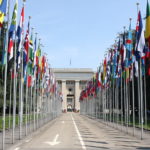As the United Nations human rights project celebrated its seventieth anniversary last month, human rights scholars and practitioners took stock of its progress, for better or worse. Sadly, the legacy of the human rights project on protection of the unborn was largely overlooked by mainstream commentators.
Over fifty million children were aborted around the world last year alone. This is without a doubt the human rights issue of our time. Yet there was no international outcry from the United Nations. None of the myriad bodies that make up the human rights system addressed this at all. On the contrary, under the influence of human rights bodies, the entire multilateral system is promoting abortion, sometimes explicitly and sometimes stealthily, under the guise of providing “sexual and reproductive health.” No international agency has been able to escape this bureaucratic abortion trap.
The diplomats and officials that today walk the corridors of UN headquarters in New York and Geneva should be remembered as villains who closed a blind eye and abetted the abortion industry as it captured the human rights system, providing it with indispensable political and financial support as it carried out its genocidal business.
Sadly, the indifference of the multilateral system to the lives of the unborn is not a mere accident of history. It is a flaw built into the human rights project itself. Indifference to human life in the prenatal phase is the original sin of the multilateral system, as it were, enshrined in its constituent agreements and diligently propagated throughout its institutions
Start your day with Public Discourse
Sign up and get our daily essays sent straight to your inbox.The Original Sin of the Human Rights Project
While the Universal Declaration of Human Rights and the treatises that made its lofty provisions into binding international law were never understood to exclude the unborn from the protection of international law, they were also never understood to encompass any positive obligations with regard to protection of children before birth. This was deliberately done to accommodate the permissive abortion regimes of Communist nations. Essentially, international human rights law leaves the scope of protections afforded children before birth to sovereign states. This has de facto, even if not de jure, stripped children before birth of any international human rights protections. And it has been the status quo ever since the founding of the United Nations.
Time and again, international negotiations from 1948 until this day have declined to address the legal status of the child before birth with any precision, even though the issue has come up repeatedly. International agreements have by design overlooked protections for the unborn in favor of deals on other pressing concerns. This is a moral failure that will not be forgotten.
Even where international agreements have expressly included protections for the unborn (as with the Convention on the Rights of the Child and the Inter-American Convention on Human Rights) or implicitly included them (as with the Universal Declaration of Human Rights and the International Covenant for Civil and Political Rights), such protections have been nullified by subsequent interpretations and applications of the treatises.
Just as the original sin of the framers of the US Constitution was to acquiesce in the evil of the slave trade in order to reach a political compromise that would unify all the colonies, the original sin of the framers of the international human rights project was to acquiesce in the heinous evil of abortion in order to permit the greatest possible number of nations to ratify international human rights instruments. This sin persists, and it continues to weigh down the human rights project, just as the evil of slavery weighed down the American political project.
UN abortion advocacy is now systemic. According to UN experts, human rights law demands the legalization of abortion. Multilateral policies and programming surrounding the notion of “sexual and reproductive health” have resulted in covert and overt promotion of abortion as a component of international human rights and in multilateral health policies. They have legitimized abortion and directed billions of dollars in government support to abortion groups who perform and promote abortion both when it is legal and when it is not.
For the last twenty-five years, the UN system has been the loudest and most influential voice in favor of legal abortion. What was initially only tentative and clandestine support is now open and brazen. No UN agency seems immune from it. It is intrusive. And it is Orwellian. In the past year alone, the UN Human Rights Committee, one of the oldest and most respected human rights bodies in the world, declared a right to abortion to be part of the right to life under international law, and all UN personnel who work on legal reforms to achieve the goal of access to justice were directed to promote legal and safe access to abortion in a systemwide inter-agency manual.
A Favorable Paradigm for the Pro-Life Cause?
Again, the text of binding international law seems to favor the protection of children in the womb, yet the texts are deliberately vague enough that there are no positive obligations to protect children from abortion or against embryo destructive research.
Some pro-life advocates see this as a favorable paradigm. They want the pro-life movement to “reclaim” the human rights project, as it were. Some even claim that positive obligations to protect children from abortion can be discerned in international human rights law. Both these positions are no longer tenable, politically or legally.
Compromise and quiet advocacy have failed time and again to obtain any results for the pro-life cause internationally. At most, they have slightly slowed the progress of a human right to abortion. Nothing short of a revolution in international policy will do if the human rights project is to be truly reclaimed.
When it comes to abortion, there is an international conspiracy of silence—or to borrow a phrase from Pope Francis, a situation of “globalized indifference.” Even nations with laws that are highly protective of children in the womb quietly watch as the abortion industry gains an ever-stronger foothold within the human rights system.
There is no coordinated effort to propel the pro-life cause. Political will is simply lacking. The truth is, when Republicans are in the White House, they don’t invest anywhere near the efforts and resources to get abortion out of international policy that the Democrats did to ensure it was included in UN policy.
To its credit, the Trump administration has gone further than any previous Republican administrations. Even so, Trump has yet to put a dent in the UN bureaucracy’s work to promote abortion, or to leverage the mighty diplomatic apparatus of the US State Department and the US Agency for International Development to advance the pro-life cause. If Republican administrations were nearly as tough and consistent on abortion as they are on the Palestinian question, abortion would have been kicked out of UN policy long ago.
It is Time to Make the Pro-Life Cause a Foreign Policy Priority
Despite these past failures, there is a real opportunity for the pro-life movement to reclaim the human rights project. The present opportunity is the result of the surge in nationalist political movements that are generally pro-life and naturally disposed to limit the authority and overreach of multilateral institutions. Still, opposing abortion internationally is not a foreign policy priority for nationalist parties. This will require moral, political, and financial resources, especially from the United States and the Holy See.
Unless sovereign states begin to fight abortion vigorously, as a matter of the highest priority, the multilateral system is doomed to be remembered as a moral failure. Some estimate that over one billion lives have been claimed by abortion worldwide since Roe v. Wade was legalized. It is not something that history can easily sweep under the rug.
Abortion would never have entered UN policy without the support or acquiescence of the United States, the most powerful country in the world and the single most influential stakeholder in the multilateral system. Abortion cannot be taken out of international policy without an equal or greater pro-life diplomatic effort from the United States.
Before the US Civil War, famous debates took place across the states about whether the Constitution had to be scrapped in its entirety because of the iniquitous compromise on slavery that it enshrined. It was the dramatic debates and religious fervor against slavery that ultimately led to the Civil War, the Emancipation Proclamation, and Reconstruction. It was not the text of the Constitution itself. This kind of debate must take place with regard to human rights if the international compromise on abortion is ever to be righted.
The pro-life movement must make the issue of abortion a political one, not just in the United States, but around the world. What happens in the dark rooms of Turtle Bay and the long corridors of Foggy Bottom has to be connected to voters. So long as debates about abortion and international policy are taking place behind closed doors and through inscrutable euphemisms, the pro-life movement does not stand a chance.














